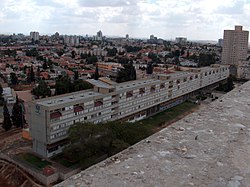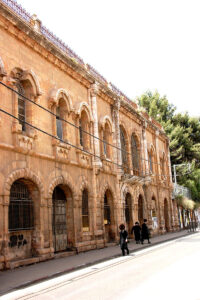That home of mine on Rehov (street) Shemaryahu near the Mandelbaum Gate which used to separate old from new Jerusalem was probably the closest I have ever come to, say, living in Baghdad or Teheran. Shemaryau was actually an alley, not a street. And that home was actually sort of a room and a half, or even less. It was freezing cold all winter; a kerosene cart, pulled by a horse, would pass by once every two days. Yael or I would run up and fill up a jerrycan of “solar” for our “fireside”. No, of course we did not have an actual fireside-the old kerosene heaters which often billowed smoke were called “firesides.” It took about 5 matches to lite the wick. And about ten minutes before the heater started to heat.
Another feature of the Shmaryahu area was the old man who came by everyday yelling “alteh zachen”-which means “old things” or used items in Yiddish. The old man was an Arab-and he did speak some Yiddish, which I certainly don’t. Nor did Yael. She was, and still is, Yemenite.
Hisachon 2/2/2 was a different story all together. Located near the ultra-religious area of Beit vaGan in Jerusalem, Hisachon 2/2/2 was an old fashioned Soviet-like public housing, with each apartment having 3 very small rooms, broken mailboxes at the entrance and an unkempt public domain at the entrance. Unkempt, but clean. Each of the three“blocks” of Hisachon had 4 entrances. I was entrance 2. 2nd floor. Apartment 2. Hence Hisachon 2/2/2. Hisachon by the way means “savings”. Appropriate, as you can see from the building in the forefront.
I shared that apartment in Hisachon with another soldier, Dany, who was born in Chile. We agreed on everything; the apartment needs to be clean; close the door when there are “guests”. Dany was to become an OD consultant as well. The best part of sharing an apartment with him was the number of books he read. Everything and anything I read, Dany had read before me. I lost all contact with him; he disappeared off the face of the earth. When Dany woke up, I could hear him whistling in the shower. He whistled well but one of his girlfriends smoked.
Stern 12 in Kiryat Yovel, Jerusalem was a royal pain in the ass. The 18 bus left me a 20 minute walk from the apartment, and in the extreme heat, that was no fun. But the 4 room apartment I shared had some interesting characters. Hans was a German student studying Yiddish literature at the Hebrew University. He spoke Hebrew with strongest German accent I ever encountered. Ilan came from an Israeli collective settlement and was almost never there, since he needed to work to finance his studies. And there was a newly married couple; she was American and he was Israeli. They hogged the kitchen and if you ask me, their marriage did not last. When I lived in Stern, I tried to learn Arabic. I spent hours up on the roof of Stern 12 with a small tape listening to Arabic. “Bas isma-wa-id vistarachah” “Just listen and answer in the break”. Yes-it was possible to sit on roof-and I loved to do so.
I had more apartments/rented rooms in Jerusalem. On Rehov Naftali in Baqa with Hadassah which is too painful to write about; in the Bucharim Quarter with a lady flatmate whose name I do not remember, and in Bayit va Gan.
Now Jerusalem is an hour and a half drive from where I live, and thousands of years in the past.




